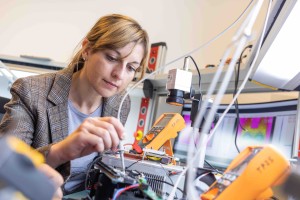During the Winter School 2018, participants investigated farms around Graz and developed concepts fit for the future in line with the owners’ specifications. The designs were presented to a panel of experts during the final presentation.
The farms of the future will be mobile, sustainable, diverse and social – that’s the conclusion of the Winter School 2018. Participants of the Master’s course in Architecture, the Bachelor’s course in Sustainable Food Management and interested parties from outside the university devised future-proof concepts during the Winter School for a total of three pilot farms. The focus was on the individual requirements of the farm owners which were precisely defined in advance.
The concepts for the farms were compiled over the course of a week. After visiting the farms and holding discussions with the owners, various designs were created. Participants had to address the individual needs and functional specifications of the farms as well as designing product ranges and marketing strategies. For example, existing vegetable beds were moved or equipped with mobile plastic tunnels.
The panel
On the last day of the Winter School, the various concepts were presented to the interested public and a panel of experts. The panel consisted of four people from agriculture and the university. Robert Schöttel evaluated the agricultural aspects of the projects, while Sabine Lienhart assessed the marketing strategy. Barbara Hammerl from Stadtlabor (evaluation of innovative content) and Jan Werner, a lecturer at FH JOANNEUM (architecture and spatial planning) provided their professional feedback on the concepts presented. The farm owners were then also asked for their opinions. The feedback was overwhelmingly positive. “Thank you for putting so much thought into it. We will certainly implement some of the suggestions and expand our farm further,” said Caroline and Bertram Michor from the ‘Hof der Vielfalt’ farm.
The pilot farms
The pilot farms which took part in the project were Hof der Vielfalt, Meißelhof and Ökologische Landwirtschaft Attendorf. The concepts devised were presented to them during the final event.
The Hof der Vielfalt farm in St. Oswald bei Plankenwarth specialises in vegetable varieties, a small apiary and growing young vegetable plants and berry bushes. There are also some farm animals. It was important for Caroline and Bertram Michor to balance their work on the farm with their private life and small children.
Farming is very traditional at the Meißelhof farm. The farm shop stocks seasonal fruit and vegetables as well as chestnuts, pumpkin seed oil and fresh bread. The meadows are home to dairy cattle, free-range geese and hens. The small family business draws on the expertise of past generations and on a love of nature.
Ökologische Landwirtschaft Attendorf is a farm with a social background run by the ‘Jugend am Werk’ association. It provides adults with a disability with special work and training in agriculture. The owner lives on-site but leaves the work on the farm to the participants in the ‘Jugend am Werk’ scheme. It is a certified organic farm and cultivates vegetables, fruit and herbs. Use of machinery is kept to a minimum and most of the work is completed by hand.
The future of the project
The concepts devised at the Winter School offer real potential for the future and are being pursued further. The interdisciplinary Bauernhof 21 project will run until August 2018.









